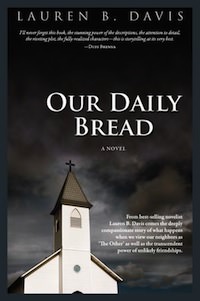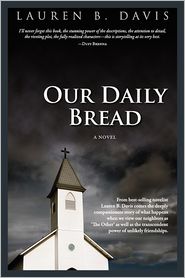Can I Help You?
In this excerpt from Lauren B. Davis' new novel, “Our Daily Bread,” an elderly woman encounters two troubled boys and the question of whether we ever do enough to help others.
Excerpted from “Our Daily Bread” by Lauren B. Davis.
Dorothy Carlisle walked down Spruce, and was passing the Italian Garden Pizzeria when familiar laughter drew her attention. It came from the passageway between the Pizzeria and Pretty-as-a-Picture Dress Shop. A voice. Two voices. One raised in inquiry. That laugh again.
Dorothy turned toward the sound. The alley was a pocket of shadow, shielded as it was by buildings on either side, smelling of pizza ovens and refuse. A figure at the end — no two — hunkered down by a dumpster, one smaller than the other. The glint of something, a flame …
“Who is that?” the authority in her voice surprised her. “Who’s there?”
The smaller figure skittered. Stood. Dorothy, sun-blind, could make out no features. “I said, who is that? What are you doing?”
“Nothing.” The larger figure still crouched, bestial, in the corner. The acrid scent of burning wafted. The figure, clearly a man, raised something to his lips. A bottle.
“Do you want me to call the police? Come out here this instant.” She should go into the dress shop. Have Doris Heaney call Carl. But on what complaint?
“We’re not bothering you.” She must be only a silhouette to them, with the sun behind her, but perhaps not.
“Albert … ” The other one spoke at last. “Maybe we should go.”
“Albert who? You are very rude, whoever you are. Is that Albert Erskine? Albert?”
“Shit.” It was said quietly, almost as though he didn’t want her to hear. The figure stood and he was tall, much taller than the other. He drank from the bottle and wiped his mouth on his sleeve.
“Albert Erskine, do not be absurd. Come out here.”
“Mrs. Carlisle?”
“Yes, it’s Dorothy Carlisle, and who is that with you?”
Her eyes adjusted to the shadows. Someone smaller, frailer. Whereas Albert was a collection of muscled slabs, thick and layered, the other was all knots of bone and angles. The small one, no more than a boy, put his head toward Albert and said something. Albert shrugged and the boy walked toward Dorothy. His gait was jerky and uneven. She fought the impulse to back away. As he neared, she saw it was Bobby Evans, Ivy’s brother, his eyes downcast on his big sneakered feet, his shoulders held up tight, hands in pockets.
“Hi, Mrs. Carlisle,” he said. Another laugh from Albert. That smell. It might be marijuana. Something else though, in the smoke.
“Are you lighting fires? You should be in school, young man,” Dorothy said to Bobby. “I’ve a mind to tell your father.” What on earth was going on in that family? Wasn’t anyone paying attention to the children? She would have a little chat with Tom Evans when she saw him next.
Albert ambled toward her and as he did, he slipped the bottle inside his battered leather jacket. He stopped directly in front of her, forcing her to look up. He had grown a goatee since last she’d seen him. It accentuated the hollow cheeks, the sharp bones. His hair fell over his brows and curled around his ears. Sunlight glittered off the lenses of his silver metal-rimmed sunglasses. He used his middle finger to push them up the bridge of his nose.
“Oh, Albert, what are you doing back there?”
“Burning trash. Nothing. Didn’t know it was you.” His breath stank of alcohol.
“Albert, listen to me. There has been a break-in at Wilton’s. If you don’t want people thinking you had something to do with that, it would be prudent not to hang around back alleys, don’t you think?”
“I didn’t rob Wilton’s.” He lowered his chin so she could see his eyes more clearly, his thin eyebrows frowning. “You saying I robbed Wilton’s?”
“No, I’m saying if people see you loitering in alleys they will call Carl. I’m sure you don’t want to spend a beautiful day like this answering questions at the police station.”
Albert ran his tongue over his lips and smiled in a rather sheepish manner. Dorothy thought, not for the first time, how much she’d like to get him to a dentist. “You worried about me, Mrs. Carlisle? That it?”
“It’s obvious you’ve been drinking and are not yourself. I’d hate to think you were giving alcohol, or anything else you shouldn’t, to a minor. You and I both know how smart you are. Don’t waste it, Albert. How many times have I said that to you?”
“Too many times, maybe,” he mumbled, not meeting her gaze now.
“I should probably say it more. You ought to get your GED. You should never have dropped out of school. It’s a waste of a good mind.”
“Give me a break.”
“You’re not like … well, you have a chance, Albert.”
“Not like the rest of the Erskines, huh?” His eyes snapped.
They were so touchy, all the Erskines. Hair-trigger the bunch of them. Maybe Dorothy didn’t blame them. “Do you want to tell me what you’re doing?”
“Nope,” he laughed. “Go see for yourself if you want, but you know what they say about curiosity. Have a nice day, Mrs. Carlisle.” With that he meandered down the street, as though he hadn’t a care in the world. Bobby Evans followed him.
Dorothy watched them and then looked back into the alley. She should call Carl. Let him handle it. That was undoubtedly the sensible thing to do. But she hated to call the police on Albert Erskine, and wasn’t completely sure Carl Whitford would care very much about boys in an alley, one of them truant from school on a beautiful spring day. She knew it was probably misguided, but she had a soft spot for Albert. So much worked against him in this town. She had watched him grow up from a skinny young boy with all those bruises. She’d even called Children’s Services once, when his little face wore the reddened, puffy evidence of a beating, but nothing had come of it. It was the mountain, everyone said. What do you expect? She didn’t want to be another one of the people against him. She wanted him to be better; to rise up against the odds and break free of his past. If you expected the best of people, wouldn’t they struggle to meet those expectations? And if public opinion expected the worst, she chose not to be amongst them.
The smoke in the back of the alley had disappeared now, although the smell lingered. Either she had stopped them from truly setting a fire, or the fire had gone out. It would only take a moment to check and there was no danger now, surely, and probably there never had been any. It was only Albert Erskine and Bobby Evans, for heaven’s sake.
It was chilly in the alley, out of the sun. Boxes lay scattered on the ground against the wall of the pizzeria in front of the dumpster. Whatever the boys had burned lay behind the dumpster. A pile of newspaper, charred around the edges. The fire hadn’t caught, then. Just some old papers and cardboard boxes, foolish mischief for which twenty-two year old Albert was far too old. But something else, in the pile. Dorothy caught her breath and she dropped her plastic bag of berries and cake. Fur there. Tortoiseshell fur. A cat? It couldn’t be they had killed a cat. Oh, Lord. Curiosity killed the cat. She couldn’t help herself, she bent forward to look more closely and when she did her stomach turned and she jumped back. Maggots in the sunken eyes, the body shrunken, withered. Long dead.
Dorothy fled to the warm brightness of the sidewalk, abandoning her shopping. There was no sign of Albert. All she wanted to do was go back to her own little shop. Her mind snapped and cracked with questions as she hurried along. They hadn’t killed the cat, then. But why try and burn it? It was disgusting. Had they found the carcass there? But then what had they been doing in the alley to begin with? Albert and the Evans boy. It didn’t ring true. Albert was at least six years older than Bobby Evans. What would he want with a boy that age?
Dorothy did not believe half the stories she heard about the Erskine clan. The Erskine women, whenever she did see them in town, always looked so haggard and worn, frightened and ashamed of their meagre purchases. For the past twenty years, every few months or so, Dorothy had driven up to North Mountain and the Erskines’ compound in the wee hours of the night, waiting until they were sure everyone was asleep. She left a box of used clothes, powdered milk, children’s toys, canned goods, peanut butter, bars of soap and toothpaste, thick socks and mittens and anything else she thought they might be able to use. Years back, when she overheard one of the teachers mentioning how smart Albert was, and what a shame it was to waste brains on someone like that, she began including books — Robinson Crusoe, Treasure Island, Tom Sawyer, The Catcher in the Rye. Dorothy hoped she was helping, in some way. Not enough. Never enough.
“Our Daily Bread” was published in the U.S. by Wordcraft of Oregon in 2011. Available from Wordcraft of Oregon, Amazon and Barnes & Noble.
Your support matters…Independent journalism is under threat and overshadowed by heavily funded mainstream media.
You can help level the playing field. Become a member.
Your tax-deductible contribution keeps us digging beneath the headlines to give you thought-provoking, investigative reporting and analysis that unearths what's really happening- without compromise.
Give today to support our courageous, independent journalists.







You need to be a supporter to comment.
There are currently no responses to this article.
Be the first to respond.